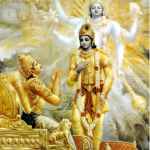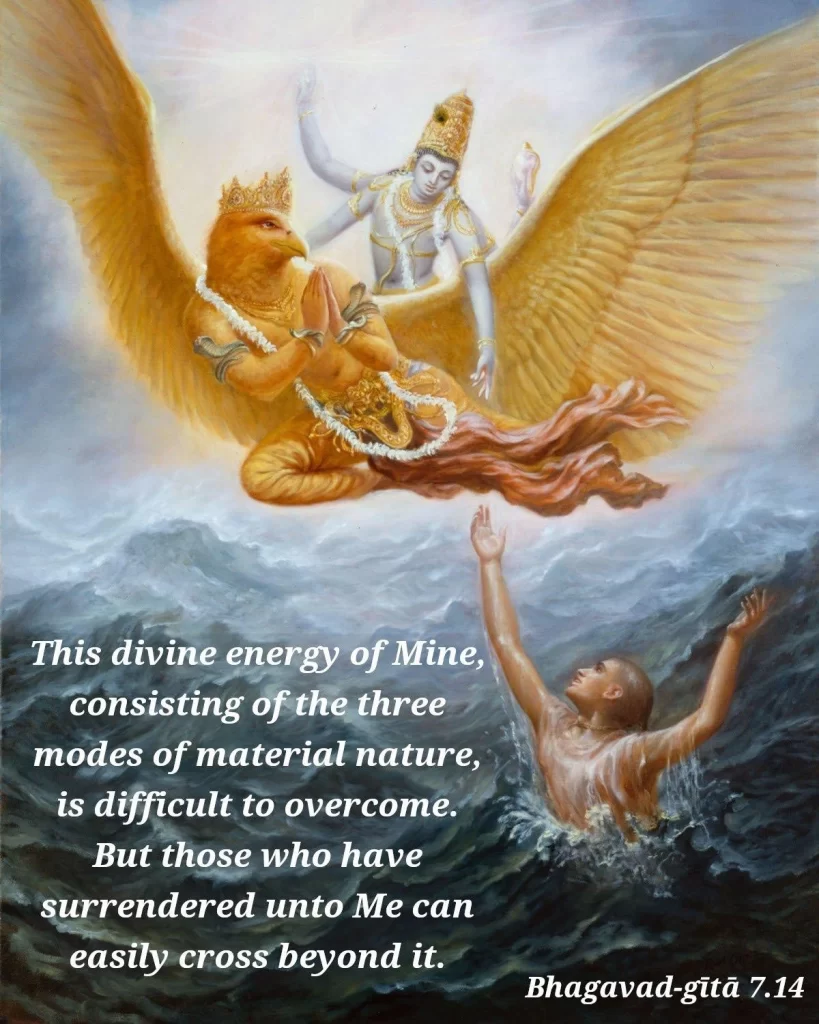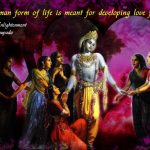The Original Source: Bhagavad-Gita Perspective – The most fundamental question in science, especially in physics is “ What is the origin of everything? ”. Physicists are trying to find the answer to this question. It may be surprising to some people, but this is also the fundamental question in the realm of spiritual science. In Bhagavad-gita, Lord Sri Krishna answers this fundamental question and how the world we experience came into existence from that original source.
Modern science postulates that inert matter is the source of everything, both living and non-living forms. Contrary to this view, Vedanta asserts that consciousness is the origin of everything. Everyone can understand that we are conscious of our bodies. But as soon as the consciousness deserts the perceptual space of the body, the body is rendered useless.
The living symptoms are manifest as long as the consciousness is present inside the body. So consciousness is the essence. A tree produces flowers, and fruits as long as the consciousness is present within and does not produce anything after consciousness departs. As we can observe, consciousness is the source of the existence of inert matter, similarly Absolute consciousness is the origin of everything or the original source of all existence. This is the crux of Vedanta.
Table of Contents
Absolute Consciousness and its manifestations.
This Absolute Consciousness is eternally existing and everything that exists is its expansion. Absolute Consciousness possesses inconceivable potencies and it expands to two kinds of space and eternal time. One is Conscious space (Cidakasha or Cinmaya akasha) and the other is Inert space (Jadakasha). In order to make the space take shape, eternal time enters into the conscious space and manifests millions of conscious planets which is also known as Vaikuntha in Vedic parlance. Similarly, inert space in combination with devouring time generates millions of universes or Bramhanda. Devouring time is the reflection of eternal time. Due to the influence of devouring time, anything created within the inert space is finally annihilate.
For example, our body is a space that started from a single cell and has grown to its present form. But this body will eventually be annihilated. This is due to the effect of devouring time. Consequently, death is the eternal symptom of this world. But in conscious space, death is conspicuous in its absense as time is eternal there. This is the essence of the Bhagavad-gita. One of the most important aspects of the Bhagavad-gita is that it clearly states what is the origin of everything. So when we describe what is the origin of everything, it means to realize this Absolute Truth or Absolute Consciousness.
Now the absolute truth with its inconceivable potencies has five aspects of its expansions. The first aspect is Isvara. Isvara is also known as supreme consciousness. The second aspect of Absolute Consciousness is known as Jiva or individual consciousness. We are all Jivas or tiny conscious entities. Tiny consciousness means we are partially conscious of our body. For example, we cannot predict what is going to happen to our body in the very next hour, or what to speak of one day. Owing to its tiny consciousness, Jiva is only aware of its own sphere of activity which is the body in which it resides. The third aspect is Material nature or Prakriti. Although Jiva has consciousness, its nature comes from this Prakriti.
As a conscious entity, the Jiva should have the nature of pure consciousness, but its original nature has been lost. For example, a person has his original dress, but he is wearing a coat on top of it and going to the office. The Jiva has given up his original dress and put on a temporary dress.
The reason can be explained as follows. Isvara, Jiva, and Prakriti being the expansion of Absolute consciousness are eternal. But when Jiva and Prakriti get mixed up, the combination produces a temporary existence, due to the influence of devouring time. The fifth aspect of Absolute consciousness is karma or activity. Karma has three varieties. They are known as akarma(Yoga), karma(Fruitive endeavor), and vikarma (Sinful activity). The Absolute Consciousness is only connected to akarma which is also known as yoga.
A combination of Prakriti, Purusa(Jiva), and Kala (devouring time) generates the variegatedness observed in this world. In this temporary variegated realm, akarma gets perversely reflected and appears as karma and vikarma. Similar to the other aspects of absolute consciousness, karma is also eternal. The devouring time is the reflection of eternal time which is a part of Absolute Consciousness. The inversion of all these aspects is again the Absolute Consciousness. Each chapter of the Bhagavad-gita is described as Yoga. This is the synopsis of the Bhagavad-gita.
Authority of Krishna
In Indian tradition, the Absolute Consciousness is known as Brahman, Parabrahman, Paramatma, etc. But the Absolute Consciousness in its complete svarupa (original form) is Lord Krishna. When we say the name Krishna, people normally think it is a Hindu name. Some people say Krishna was a superhuman being born 5000 years ago. But this is a ridiculous proposition as Krishna says in Bhagavad-gita (9.11).
avajānanti māṁ mūḍhā
mānuṣīṁ tanum āśritam
paraṁ bhāvam ajānanto
mama bhūta-maheśvaram
Fools deride Me when I descend in the human form. They do not know My transcendental nature as the Supreme Lord of all that be.
Avjananti means wrong understanding and mudha means fools. It’s obvious that fools will always have the wrong understanding. There are many people who think that through the practice of Yoga Krishna or Rama became Bhagavan. These people have been condemned by Krishna in Bhagavad-gita.
Neither Rama nor Krishna is a Hindu name nor Bhagavad-gita expounds Hindu religion (dharma). Bhagavad-gita talks about Sanatana dharma or eternal religion. It is beyond the influence of time. Bhagavad-gita is spoken by Krishna and everybody accepts it as an authoritative book. So the pertinent question is what is the authority of Krishna. Krishna says in Bhagavad-gita (10.8).
ahaṁ sarvasya prabhavo
mattaḥ sarvaṁ pravartate
iti matvā bhajante māṁ
budhā bhāva-samanvitāḥ
I am the source of all spiritual and material worlds. Everything emanates from Me. The wise who perfectly know this engage in My devotional service and worship Me with all their hearts.
All spiritual worlds and material worlds mean Cidakasha and Jadakasha respectively. This means Krishna is the source of both Cidakasha and Jadakasha. Prior to that Krishna says in BG 7.6.
mattaḥ parataraṁ nānyat
kiñcid asti dhanañ-jaya
mayi sarvam idaṁ protaṁ
sūtre maṇi-gaṇā iva
O conqueror of wealth, there is no truth superior to Me. Everything rests upon Me, as pearls are strung on a thread.
So when Krishna is saying something, we have to accept it as it is. No one can impose his own opinion on His statement. For example, some author has written some article or novel. No one can speculate on the meaning of any word or sentence without asking the author. But in the case of Bhagavad-gita, everybody feels they have the liberty to interpret according to their own whims. This is the duplicitous nature of these people. We must accept what Krishna says from His perspective. Direct meaning has to be taken as language can have multiple meanings. For example, some unscrupulous commentators mislead people to surrender to the unborn within Krishna but not Krishna Himself as if he is better than Krishna. As if Krishna has left something to be opine by some rascal.
When we are reading Bhagavad-gita, we are treading in a sphere where everybody matters. Normally in our day-to-day life, only things connected to us matter e.g. our job, career, etc. But when we read Bhagavad-gita, everything and everybody matters. So anybody who understands Bhagavad-gita, automatically acts in a way, such that the totality of existence becomes his own family i.e. vasudhaiva kutumbakam. But why is this important? What’s wrong if we are concerned with the things that matter to us? As we have concentrated most of our energy only on what matters to us, as a result, everything around us has been destroyed. Destruction of the environment, global warming, and animosity among fellow humans as well as nations have created a hellish atmosphere around us.
There is no comparison of Bhagavad-gita with any book throughout the world
Unless we bring harmony to every living entity and everything that exists around us, we are sure to invite more suffering. Bhagavad-gita is the harmonizing principle by which everything exists. When we enter into Bhagavad-gita, we enter into that harmonizing principle. So Bhagavad-gita is beyond man-made religions (dharma) like Hindu, Muslim, Christian, etc. This is the reason, Allahabad high court passed a judgment that “Bhagavad-gita is religion-neutral”. In fact, the court moves further and state that it should be declared as national literature. Before reading any book, it is important to have some preliminary understanding of that book.
Bhagavad-gita is not an ordinary book. It is a very very special book. Bhagavad-gita cannot be comprehended as we understand lessons in universities and schools. It is beyond the ambit of empiricism. Bhagavad- gita is understood only through revelation within one’s own divine perceptual space. It requires continuous hearing from the persons who have internalized the message of Bhagavad-gita in their hearts and live according to it. The hearing will enable us to be a fit candidate for receiving knowledge of the Bhagavad-gita.





